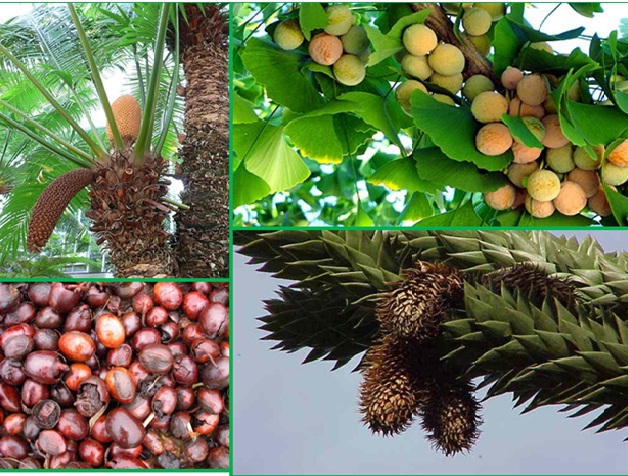
Edible Gymnosperms
A gymnosperm, (Greek gymnospermos, =”naked seed”), is a seed that does not have an enclosure. The following gymnosperms are culinary nuts. All but the ginkgo nut are from evergreens.
- Cycads (Macrozamia )
- Burrawang nut (Macrozamia communis), a major source of starch for Indigenous Australians around Sydney.
- Ginkgo nuts (Ginkgo biloba) are a common ingredient in Chinese cooking. They are starchy, low in fat, protein and calories, but high in vitamin C.
- Araucaria spp.:Bunya nut (Araucaria bidwillii) is native to Queensland, Australia. Nuts are the size of walnuts, and rich in starch.
- Monkey-puzzle nut (Araucaria araucana) has nuts twice the size of almonds. Rich in starch. Roasted, boiled, eaten raw, or fermented in Chile and Argentina
- Paraná pine nut (Araucaria angustifolia) (or Brazil pine nut) is an edible seed similar to pine nuts
- Pine nuts (Pinus) Pine nuts can be toasted and added to salads and are used as an ingredient in pesto, among other regional uses.
- Chilgoza pine (Pinus gerardiana), common in Central Asia. Nuts are used raw, roasted or in confectionery products
- Colorado pinyon (Pinus edulis), in great demand as an edible nut, with average annual production of 454 to 900 tonnes.
- Korean pine (Pinus koraiensis), a pine-nut yielding species native to Asia
- Mexican pinyon (Pinus cembroides), found in Mexico and Arizona. Nuts are eaten raw, roasted, or made into flour
- Single-leaf pinyon (Pinus monophylla) grows in foothills from Mexico to Idaho. Eaten as other pine nuts. Also sometimes ground and made into pancakes
- Stone pine, or pignolia nut (Pinus pinea) is the most popular commercially important pine nut.
Image curtesy: studyres.com
Author: Sumana Rao | Posted on: August 19, 2015
« Previous Article
Next Article »
« The six most common types of edible mushrooms Medicinal Bryophytes »
« The six most common types of edible mushrooms Medicinal Bryophytes »






















One Comment on “Edible Gymnosperms”
The italian stone pine’ seeds are one of the most excellent foods I have ever tried. Local Florida pines also produce pine seeds that are edible, however I have never tried them because it takes them years to produce seeds.
Write a comment